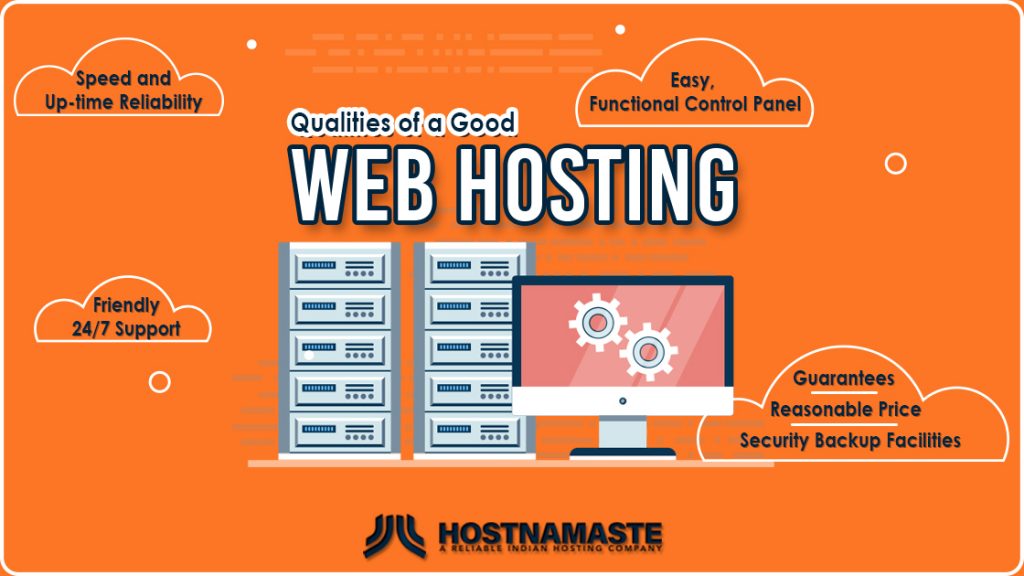
The “best” web host isn’t necessarily the one with the most features, but the one that best suits your needs. With that said, however, choosing the best web host is far from an easy task. A web host that may be perfect for one website may be terrible for another. Thus, there are several factors that you need to take into serious consideration. Some of these factors may be dispensable for your website, while others may be absolutely necessary. In the end, you will need to decide for yourself what qualities you need to prioritise in order to get the best web host for your particular needs.
For the most part though, the following factors will likely have some importance for a typical website.
Essential Qualities of a Good Web Host

1) A Good Web Host is Reliable
Perhaps the most obvious factor that you need to take into consideration is the overall reliability of your web host. Clearly, when a web host is not reliable, it’s going to be bad for your business. Imagine your website as a brick-and-mortar business. Your business needs to be there whenever your customers want to visit. If your business is going to suddenly close every few hours, then it’s unlikely that you will inspire any form of loyalty from your customers. They may put up with some inconsistency every now and then, but they’re sure to stop coming if you don’t get your act together quickly. Every lost visitor represents in lost profit, lost subscribers, and lost reputation. Though one or two might not amount to much, all these losses will eventually add up and cause significant harm to your web site.
The best way to ensure that your web host is reliable is to do your research. There are plenty of ways to do this. You start by checking “Top 10” lists or other similar articles to get a general feel for which web hosts are popular. However, make sure to check several of these lists, so that you can compare their contents. Put together your own list based on your research. The more lists a particular web host appears in, the more likely it is to be of good quality.
Once you have your own list, you can then research each potential web host in more detail. In particular, you’re looking for a web host with over 99% guaranteed uptime. Additionally, you should do a thorough search for customer complaints and reviews. There are plenty of websites and web hosting forums where you can ask other members of the community for their opinions on a particular service.
2) A Good Web Host is Fast
No one likes waiting in lines. Going back to our brick-and-mortar business analogy, if you make your customers wait half an hour for a simple cup of coffee, you’ll likely end up with a very dissatisfied customer. The same concept applies to websites. If visitors have to wait several minutes for a single page to load, chances are that visitor is either going to give up and leave or never come back to your website once he gets what he wants. In fact, some studies even claim that a loading time of more than three seconds will result in significantly lower conversion rates. In other words, if your visitor needs to wait for more than three seconds for a particular page to load, then there’s a much lower chance that he will purchase the product sold on your website or subscribe to your service.
When a website is sluggish, it’s often due to one or more of the following: slow network speed, database problems, and overburdened servers. You can fix the first two issues yourself. However, you will need to rely solely on your web host to solve the third issue.
There are several reasons why a server can become overburdened, such as limited disk space and memory, outdated processors, and network connectivity problems. But, as we already mentioned, all these problems can only be addressed by your web host. This brings us to the next section.
3) A Good Web Host has Excellent Technical Support
Web hosting can be very complicated. Although downtime, slow server speeds, and other technical issues should be very rare, they are eventualities that you need to prepare for. Moreover, regardless of your technical expertise, it’s likely that there will be some issues that require physical access the server. Now, unless you want to fly all the way to your web host’s office, you’ll probably be better off investing additional time and effort searching for a web host that already has good technical support.
But what is considered “good” technical support? You basically need to look at the following three factors.
First, you need to consider how you can reach out to the support team. A quality web host will likely give you several options, such as live chats, a toll-free phone number, email, support tickets, social media, and web hosing forum. The more options you have for contacting them, the better off you’ll be.
Second, you need to consider their support hours. Many web hosts currently offer 24/7 support, but this can be very misleading since it actually takes them several hours to get back to you. Sure, you’re able to leave them a message saying your website is down. But leaving a message does little good if it takes them 12 hours to respond and another 12 hours to act on your complaint.
Third, you need to consider how their support team responds to your complaint. As mentioned earlier, some web hosts take forever to address their customer’s concerns. What further aggravates the situation are the rare instances where their “solution” fails to resolve the issue.
In summary, a good web host has a support team that’s easy to reach; responds quickly; and provides solutions which completely eradicate the problem.
4) A Good Web Host has Large Storage Capacity
The amount of storage space required for your website will largely depend on the amount and type of data that you’ll be using. Small and medium-sized businesses will typically need only a few gigabytes of storage. However, if you intend to use several high-resolution photos and videos on your website, then you’ll need significantly more space.
Make sure that you plan ahead when it comes to this factor. Though it is possible to move your website to another web host, it is by no means an easy task. There are also some services that will do this for you, but this will most likely come with a fee. In other words, moving your website will require significant expense, whether that expense comes in the form of time, effort or money.
There are also web hosts that offer “unlimited” storage capacity. While this is technically true, the common practice is to attach certain terms and conditions to the offer which restrict your use of their service after reaching a certain threshold. So, to avoid possible issues down the road, you should read the details of the offer very carefully and get in touch with a customer service representative if you have any further questions.

5) A Good Web Host has Substantial Bandwidth
Many people confuse storage capacity with bandwidth. While storage capacity and bandwidth are closely related, they are technically different. Storage capacity refers to the amount of data your web host will allow you to store. On the other hand, bandwidth refers to the amount of data that your visitors can download or upload per month. Once you reach the predetermined limit, your web host will either charge you extra or completely cut you off from the server. Though this may seem harsh, the limit is there for a reason. It protects your web host from unscrupulous subscribers who overload the server and use up all its resources.
To further simplify this concept, let’s go back to our brick-and-mortar business analogy. Imagine a business with unlimited inventory but, for one reason or another, your landlord only allows you to serve 100 customers in a month. Those 100 customers represent your bandwidth. If you want to serve more customers, you need to pay your landlord more rent.
At this point, it should be abundantly clear why you need a web host that offers substantial bandwidth for a reasonable cost. Ideally, that web host should also give you the option of buying additional bandwidth, just in case you need it.
6) A Good Web Host allows you to Manage Multiple Domains and Subdomains
When you’re just starting off, you will probably need only one domain. However, as your website grows, you’re going to want to add more content and, consequently, organize that content as neatly as possible. One great way of organizing content is the use of subdomains.
Say for example that you already have a good amount of content on your website. However, for one reason or another, it’s not generating as much traffic as you want it to. One good solution to this is to start a blog. Unfortunately, the downside to this solution is that it can clutter your website very easily, especially if you’re uploading numerous blog posts per month. So, how do you start a blog without cluttering your website? Easy. Keep your blog on a subdomain.
Here’s another situation. Let’s say you get everything you want out of your website. In fact, it’s so successful that you now want to branch out with another website into a closely related industry. Naturally, your new website will need to have its own domain, web pages, content, etc. Conversely, if traffic on your website starts to slow and you want to start a new one without completely abandoning the other just yet, then you’ll also need a new domain.
Having multiple domains and subdomains is completely natural and can even be a necessity for some types of business. Therefore, you need to prepare for that possibility. Choose a web host that allows you to manage multiple domains and subdomains from a single account. It will make maintenance and management much easier down the road.
7) A Good Web Host has a Compatible and Intuitive Database Management System
Database management systems refer to the software or interface that allows you to create, manage, update, and retrieve data. It essentially manages three important features of your website: the data itself which is basically all the content on your website; the database engine which is the software that allow you access, modify, update, and lock the data; and the database schema which is the structure in which data is arranged in the database.
In addition to the above mentioned tasks, a typical database management system also allows you to tune and monitor performance, change management settings, backup and recover data, automate rollbacks, and log website activity.
With all that said, the advantages of having a database management system for your website should be obvious. However, before you can enjoy these advantages, you first need to make sure that the database management system offered by your web host is compatible with your website. There are several types of database management systems on the market and discussing each type would be too laborious for this article. If you want to avoid all the extensive research, however, the easiest way to ensure compatibility is to simply talk to your potential web host’s customer service representative. They’re probably going to ask you a few questions about your website, but once you provide them with all the necessary information, they should be able to give you a very clear yes-or-no answer. If they give you an ambiguous response, then you should probably consider a different web host.
8) A Good Web Host is Compatible with your Web Framework
A web framework refers to the set practices, concepts, and criteria designed to standardize the way your website is built. Without a web framework, developers would need to write the code for your website from scratch, which can be very time-consuming to say the least. A web framework helps developers and designers cut down on much of the work that goes into building a particular website. It not only makes the process faster and more efficient, it also reduces the chances of bugs and other technical issues.
Not all websites, however, employ the same web framework. Moreover, not all web hosts and web frameworks are compatible with each other. So, it’s very important to do your research beforehand. Make sure you choose a web host which supports your preferred web framework.

9) A Good Web Host supports your Content Management System
A content management system essentially refers to the interface you use to manage all the content of your website, including text, photos, videos, audio, maps, graphics, and applications. Popular examples include WordPress, Joomla, and Drupal.
Although most web hosts now support the above mentioned examples and other popular content management systems, there are exceptions. So, when choosing a web host, make sure it supports whichever content management system you prefer using, so you can make website management easier and more convenient down the road. This is especially true if you’re using a less popular solutions like MODX or Mura.
10) A Good Web Host has Reliable Backup Procedures
Many web hosts regularly backup the data on their servers. These backup intervals can be daily, weekly or monthly, but can sometimes even occur in extraordinary situations, such as when the web host decides to introduce a major update. Aside from the automatic backup option, some web hosts even offer a manual backup feature, which allows their users to initiate the backup procedure themselves.
Whatever the case, it’s important to choose a web host that has reliable backup procedures. Preferably these procedures should be automatic and set to occur weekly. Monthly backups may also be acceptable, but you risk a significant portion of your data if you choose this option, especially if you’re operating a video sharing site, forum, or other website that is updated very frequently. In these instances, losing a month-worth of data is simply too much to risk.
Often times, there’s little difference price-wise when it comes to plans offering different backup frequencies. If there is an added cost to more regular backups, then that option might be preferable if you have a fast-moving website like the examples above.
11) A Good Web Host is Secure
Cybersecurity is a very important feature, especially if your website deals with a user’s personal data, such as names, addresses, and credit information. A security breach can be anything from dangerous to disastrous, depending on its severity and the type of information that was leaked. Keep in mind that any lapse or negligence on your part could result in costly and very public lawsuits.
Considering how important cybersecurity can be, you should spare no expense when it comes to protecting your website from hackers, bugs, and malware.
In connection with this, the backup procedures discussed in the previous section can also be incredibly helpful, especially in the unfortunate event of an actual security leak. Once you confirm the existence problem, your first instinct will probably be to try and fix it. However, just in case the problem persists, you should always have the option of rolling back your website to a previous clean version.
12) A Good Web Host provides you with Custom Email Accounts
Although this may not be an essential feature for some websites, it certainly wouldn’t hurt to have a customised email account either. After all, customised email addresses, such as [email protected], undoubtedly look more professional than generic ones, such as [email protected].
In connection with this factor, you may also want to look into the number of email accounts that you can create, so that you can provide customized email accounts for your future staff as well, such as [email protected]. Obviously, the more accounts they can give you, the more advantageous it will be for you down the road.
Aside from the above, you should also check if they allow you to integrate or connect their email system with other related programs such as Gmail or Outlook. You should probably setup one forwarding address, so you’ll only need to check one email address for all your new mail. Otherwise, you’ll need to check each address separately, which will obviously be a very time-consuming process.

13) A Good Web Host offers useful E-commerce Features
If you’re operating an online store, subscription-based service, or some other website that sells something online, then you’ll probably want a web host that has e-commerce features. Some of these features will be essential for your website, while others will only be useful extras.
Essential features include mobile compatibility, customer support, payment gateways integration, shopping cart, scalable infrastructure, and backend reports. Useful extras, on the other hand, include SSL certification, one-click checkout, newsletter, product zooming, wish list saving, and search bar. Having these extras will undoubtedly boost your sales conversion rate, but they aren’t exactly necessary to operate an online store. Chances are that your web host will charge you more for the extras but will make the essentials either a standard plan inclusion or will charge a minimal amount for them.
With that said, it’s fairly easy to see why you should go for a web host that offers essential and extra e-commerce features if you’re operating an online store or similar website.
14) A Good Web Host has Fair Pricing
You get what you pay for. If a web host is offering you a very cheap hosting plan, then chances are that you’ll only get the most basic service. Extra features will cost extra money and, oftentimes, the most desirable features will cost more than the others. There are, however, exceptions to this general rule. Some web hosts will offer great features for a minimal cost, while some others will also overcharge for even the most basic features. Pricing varies wildly between web hosts, so it’s very important that the web host you choose offers fair pricing or payment plans.
Useful Extras of a Good Web Host

Now that we’ve covered the essential factors or characteristics that make a good web host, let’s move on to the extras. The following factors may not be indispensable for a good web host, but they are definitely worth having even if you have to spend a little extra cash to do so.
1) A Good Web Host has Domestic Servers
A web host whose servers are located locally will likely be faster and more reliable than one whose servers are located abroad. Why? Because it takes time for information to ping back and forth from the computer accessing the information to the server hosting it. The farther away these signals have to travel, the longer it will take your website to load.
Even if the differences in speed and stability are negligible, domestic web hosts will often be easier to get in touch with than foreign ones. There are several obvious reasons for this, such as time zone differences and language barriers.
So, to get the best results, you should pick a web host with servers in the country where most of your visitors reside. After all, they’re the ones who will suffer or benefit the most from the added speed and stability. Moreover, web hosts with domestic servers will often rank higher in search engine results than those with foreign servers. In other words, if most of your visitors are in the United States, then you probably shouldn’t pick a web host with servers in Europe or Asia, even if they are sometimes cheaper or if you are operating from there. What matters most is where you’re generating most of your traffic.
2) A Good Web Host has a Positive Reputation
It’s not uncommon for people to make purchasing decisions based solely on the reputation of the seller or service provider. The same holds true when choosing a good web host.
More often than not, there is a good reason why reputable web hosts are so popular. With a few rare exceptions, reputable web hosts only become popular by consistently providing high-quality service. In other words, they’re often faster, more reliable, more secure, and have better overall features than their lesser known competitors. One surefire way to verify this is to conduct a thorough search for customer ratings and reviews. You’ll also want to give less weight to extreme reviews, such as the ones which describe a service as “perfect” or conversely described it as the “worst.” While there are some genuine reviews of this type, the more reliable reviews tend to be the ones which thoroughly describe the service by giving both pros and cons. After all, it’s unlikely that you’ll across a perfect web host that does everything flawlessly. What you should be looking for is a web host that does what it promises to do reliably and at a reasonable price.
Here are a few ways to check the Reputation of your Web Host.
- Check popular review websites. There are plenty of websites out there which offer “Top Ten” lists and the like. These websites often invest a ton of time and effort into researching which entities (in our case, web hosts) to include in their list. Check out a few of these websites and compile a short list of potential web hosts that frequently place high in their lists or have high ratings based on their reviews.
- Check their social media profiles. Facebook, Twitter, and LinkedIn should be a good start, but try to be as thorough as you can. In particular, you’re looking for common customer complaints and reviews, as well as the web host’s responses to those complaints.
- Check online forums and boards. Forums and boards are a great way to gather information. They provide a venue for people to ask questions, receive answers, and express their points of view regarding various issues. All you need to do is find a reliable forum which focuses on website building and you’ll be able to ask the community anything you want regarding different web hosts.
- Ask friends and family. Asking personal friends and family, especially those who own their websites or work in web development is another great way to find reputable web hosts. Ask them about their experiences and which web hosts they would recommend. The added advantage to this method.
3) A Good Web Host will give you Room to Grow
A good web host will give you access to additional resources on demand. In other words, it will allow you to change or upgrade your plan, purchase additional storage space and bandwidth, and give you other options that are responsive to the needs of your website.
Although most of the web hosts on today’s market will already allow you to do this, some web hosts will make upgrading easier than others will. If you end up with a web host that does not give you room to grow, then you will have to choose between transferring to a new web host or sticking with their bad service. However, since you obviously don’t want to hinder the growth of your website, then that choice is really no choice at all. You need to transfer web hosts. Unfortunately, this is much easier said than done.
Essentially, if you ever need to transfer web hosts, you will need to go through the search process all over again and re-evaluate your existing options. Once you have a short list, you’ll need to do more thorough research regarding each potential web host on that list. Some of the things you’ll need to figure out are the features they offer, their subscriptions plans, and their customer reviews, just to name a few. This entire process could take anywhere from a few days to a few months, depending on the amount of the research you want to invest in the endeavour. For this entire period, your growing website will have to suffer from the lack of resources of your existing web host. This will undoubtedly result in slow loading times, unstable service, and other technical issues. Consequently, visitors will start to get frustrated and your web traffic will slowly decline.
With that said, it’s easy to see why you should prefer a web host that gives you a ton of room to grow or at least gives you the option to upgrade to a higher-tier subscription plan immediately upon demand.
4) A Good Web Host will have a reasonable subscription period and Money-back Guarantee
Subscription plans oblige website owners to pay for web hosting for a predetermined amount of time. In most cases, these plans will often range from one to five years, but in rare instances can be even longer. Moreover, plans with longer subscription periods usually offer lower monthly rates. The potential savings are, more often than not, the main reason why subscribers sign up for unreasonably long contracts. However, it is usually too early to tell whether or not a website will last for longer than two years when it’s just starting out. This is why we discourage new website owners from signing up for subscription plans which last longer than two years.
If you are seriously considering a very long-term, however, try looking for one that offers a money-back guarantee. That way, you won’t get stuck with bad service in case things don’t work out.
Conclusion: The Perfect Web Host is the One that Best Suits Your Needs
As was mentioned at the start of this article, there’s really no such thing as a web host that’s perfect for everyone. The closest thing you can get to a perfect web host is to find one that best suits your needs. Unfortunately, this is easier said than done, especially if it is your first time building a website. There are several factors that you need to take into consideration. Some of these factors will likely be essential for most websites, such as the web host’s speed, reliability, and features. On the other hand, oter factors may only be useful extras that you don’t really need but will be nice to have anyway. These extras are often worth a little added cost, but you shouldn’t break the bank just to get them. Useful extras include a good reputation, domestic servers, and reasonable subscription periods.
Now that you know what you’re looking for in a web host, we sincerely hope that you’ll be able to find the best one for your website. All you really need to do now is to put in the time and effort to search for the best one. Make a list of factors that you want to prioritize and put together a shortlist of potential web hosts that have these factors. Once you have your shortlist, you can then study each web host in more detail. In particular, you’ll probably want to check their general reputation, particularly what their former and existing subscribers have to say about their service.




7 Replies to “Qualities of a Good Web Host”